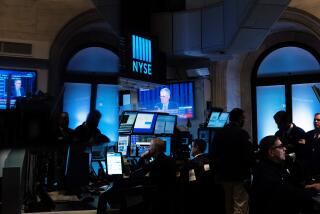Funds Legend Calls It Quits, Will Cash In Huge Portfolio : Securities: Michael H. Steinhardt says he’ll pursue new projects. He suffered big losses in 1994 when bonds collapsed.
- Share via
Michael H. Steinhardt, a legendary money manager whose private investment funds have increased an average of almost 25% a year for three decades, announced Wednesday that he’s liquidating his $2.6-billion family of funds to pursue other interests.
Though less familiar to the public than billionaire investors Warren Buffett and George Soros, the rotund, mustachioed Steinhardt nonetheless is considered one of the best money managers Wall Street has ever produced.
Steinhardt’s main fund, Steinhardt Partners, has chalked up a compound annual growth rate of 24.3% since it was formed in 1967, excluding management fees.
But the past two years haven’t been kind to Steinhardt. His funds, which had been growing at nearly 30% a year, suffered huge losses in 1994 when the bond market collapsed.
In a letter sent Wednesday to his partners, Steinhardt, 54, said, “This is a personal decision and not an easy one for me.” He said he decided that “the end of this year will be the time to turn my energies to new projects.” He could not be reached for further comment.
Although Buffett is renowned for buying stocks and patiently waiting for them to appreciate, Steinhardt and Soros run big, risky and volatile “hedge funds” that sometimes can single-handedly move markets.
“I hold Soros and Steinhardt in the same breath, because they both have 30-year careers with funds that have outstanding performance records,” said E. Lee Hennessee, who tracks hedge funds for the investment firm Weiss, Peck & Greer in New York.
Hedge funds are reserved for people who can invest $1 million or more and, despite the name, the funds have little to do with conservatively protecting a portfolio. Rather, they make massive bets that some markets will go up while others go down, in order to quickly capture big profits. They often use borrowed cash to help them “leverage” their bets even higher.
They invest in various securities, including U.S. and overseas stocks and bonds, foreign currencies and currency futures, as well as shares of bankrupt companies. They also often “short” those securities--in essence speculating that they will drop in price--to profit from falling markets. Steinhardt’s holdings include a 1.1-million-share stake in Los Angeles-based Arco, according to recent regulatory filings.
But Steinhardt and the others occasionally guess wrong and suffer enormous losses as a result.
Steinhardt Partners, which operates out of New York, is estimated to have lost $250 million in the 1987 stock market crash, after Steinhardt loaded up on stocks days before the market collapsed. His funds also took a beating during the global bond market debacle last year, when Steinhardt, Soros and others were caught off guard by a sharp rise in interest rates that sent bond prices tumbling.
Steinhardt’s losses in that turmoil weren’t revealed, but Wall Street estimates ranged from $500 million to $1 billion. The losses also reportedly eroded Steinhardt’s own net worth to below $500 million, prompting Forbes magazine to remove him from its list of the 400 richest Americans.
Also in 1994, Steinhardt’s firm agreed to pay $40 million to settle federal regulators’ allegations that the firm was part of a group that violated antitrust and securities laws in 1991 by helping to corner the market in an issue of two-year Treasury notes. Steinhardt’s firm did not admit any wrongdoing.
More to Read
Inside the business of entertainment
The Wide Shot brings you news, analysis and insights on everything from streaming wars to production — and what it all means for the future.
You may occasionally receive promotional content from the Los Angeles Times.











